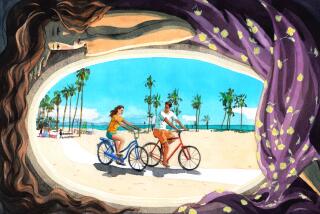A Love That Even the Governor Couldn’t Crush
Movie romances can’t hold a candle to history’s real thing--such as a poignant love story of a rebellious Spanish beauty who captured the heart of a Yankee sea captain, and whose descendants included a U.S. president.
This pinnacle of romance--California’s first recorded elopement--also bore bitter fruit: The couple were jailed separately for six months, and a scorned governor’s jealousy led him to try to stop their marriage. But it made a compelling legend that would live on.
For the record:
12:00 a.m. March 18, 2001 For the Record
Los Angeles Times Sunday March 18, 2001 Home Edition Metro Part B Page 3 Metro Desk 1 inches; 35 words Type of Material: Correction
Roosevelt’s relative--Former President Franklin Delano Roosevelt was misidentified in the Then and Now column on March 11 as the great-great-grandson of California pioneer Henry Delano Fitch. Roosevelt was Fitch’s third cousin, twice removed.
Until 1848, Americans were forbidden to enter Mexican-ruled California. They came just the same. One of them who sought adventure and fortune in spite of the ban was Henry Delano Fitch, a Massachusetts-born sailing man.
In 1826, he was captain of the Maria Ester, one in a fleet of American-owned merchant ships that glided into California ports. They carried smuggled sugar, liquor and other exotic merchandise to trade for cowhides, which traders called “leather dollars.”
On a San Diego stop during that trip, the tall, blue-eyed, 27-year-old captain caused quite a stir among the eligible senoritas. But it was the 16-year-old daughter of the influential Joaquin and Maria Ignacia Carrillo who caught the captain’s eye when she came aboard to shop for dress fabric.
Maria Antonia Natalia Elija Carrillo, nicknamed Josefa, was quite taken with Fitch. She invited the captain to a party that her parents were hosting for the governor.
The governor, Jose Maria Echeandia, was described as a “thin, juiceless man” who might have weighed 123 pounds with rocks in his pockets, but he adored Josefa. His coughing spells, many believed, were faked--an excuse to move the entire state capital from Monterey to San Diego, to be near his beloved. Many a morning, before dawn, the governor sang love songs under her window, while locals pulled pillows over their heads.
Although a match would have meant even more social and political power for the Carrillo family, Josefa never took him seriously, referring to him as “a funny, ugly little bantam rooster of a man,” one of her descendants recorded. California was amused at his unrequited love.
Actor Leo Carrillo, a great-great-great-nephew of Josefa and Fitch, wrote in his book “The California I Love” that the governor acted “. . . lovesick, like a youth in his teens. . . . He had ants in his pantalones.”
During the fiesta at her parents’ home, Josefa flirted outrageously with Fitch on the dance floor, and all the while the governor watched with disdain and jealously.
Fitch quickly fell in love, and his written promise of marriage followed. Even though he was a foreigner, Josefa’s parents liked his dashing looks and good manners and approved of the match.
But a powerful man’s jealousy can be ugly.
Romances moved slowly then. Fitch set about building his fortune. The marriage needed the official approval of Mexico City. The governor nipped that in the bud.
Yet even if they had to wed without the approval of church and state, the couple were determined. In April 1829, Fitch converted to Catholicism and then secretly enlisted the help of the Dominican friar who baptized him. The padre promised to marry the couple the next day in the Carrillos’ San Diego home, now the Presidio Hills Golf Course clubhouse.
But the still-jealous governor got wind of the plans. At the moment the bride and groom joined hands, a messenger arrived with an order from the governor: Stop the wedding.
The nuptials collapsed. Josefa’s uncle, an aide to the governor, refused to serve as witness, fearing his employer’s wrath and even imprisonment. Reluctantly, the padre changed his mind too.
Fitch insisted that the ceremony proceed. Josefa, in tears, pleaded with the padre. He did not relent--but he did remind them that, in other countries, the laws were less stringent.
“Why don’t you carry me off, Don Enrique?” the bride-to-be mused half-
humorously to her betrothed. There and then, Fitch and Josefa sat down with their good friend, Josefa’s cousin, Pio Pico, who within a few years would become governor himself. Fitch returned to his ship, and that night he anchored off Point Loma, waiting for high tide and his bride.
Josefa, not wanting to implicate her parents, escaped her home in the darkness, leaving no note. Her cousin Pico was waiting. He gallantly swung her up onto his saddle, and, astride one of his favorite racehorses, he took off with Josefa, heading south for Point Loma.
As they reached the shoreline, Fitch was waiting. He embraced her, then shook hands with Pico before lifting his bride and carrying her to the waiting rowboat. They made for the ship. By the time Josefa was missed at home, the couple had already set sail for Chile, where they were married on July 3, 1829. California could talk of nothing else; some people were scandalized, others cheered the lovers. Josefa’s mother shut herself in her room for weeks.
Almost a year later, the couple returned to San Diego, their infant son enfolded in Josefa’s arms. Josefa had to beg her father’s forgiveness, scooting on her knees across the floor until he finally embraced her.
But their ordeal was far from over. Fitch was soon summoned by Jose Sanchez, the Franciscan vicar general, to account for himself. Instead, Fitch sent him their marriage certificate and sailed north on business with his wife and son.
Incensed, Sanchez sent word to Gov. Echeandia, whose thwarted love had been replaced by anger at the couple’s defiance. On the grounds that the marriage was not legal, the governor arrested Fitch in Monterey and charged him with abduction and other “heinous crimes.” Josefa was kept under house arrest.
Three months later, the governor shipped them to the San Gabriel Mission under guard to face trial. The prosecutor set out to prove that the laws of church and state had been broken and that their marriage was null and void.
For a month, the accused couple were interrogated, and witnesses’ testimony was gathered. Finally, the prosecutor conceded that their motives were honest and pure, and dropped the case. The real culprit, he went on, was the scorned governor.
So the vicar general found that the marriage, though “not legitimate” in the eyes of the church, nonetheless “was valid.” But there was still penance to be paid. The couple were ordered to attend high Mass for three feast days while holding lighted candles, and to recite part of the rosary for 30 consecutive days. Fitch was also ordered to donate a 50-pound bell to the plaza church in Los Angeles.
Vindicated and reunited after six months apart, Henry and Josefa returned to San Diego, where they had 10 more children in quick succession. Between his trips as a port-to-port salesman, Fitch kept a general store at Old Town and was prominent in politics.
In 1840, he was granted 48,000 acres of Rancho Sotoyome, a name derived from the Indian word satiyomi, which means “brave or handsome ranch.” It was centered at what would become the town of Healdsburg in Northern California’s wine country.
But Fitch never lived there. He died in 1849 at age 49 and was the last person to be buried in the cemetery of San Diego’s original settlement, the Presidio. After her husband’s death, Josefa moved north to their rancho.
She died in 1893 at age 82. On the other side of the country when she died, her great-great-grandson was 11 years old. His middle name was that of his great-great-grandfather, Delano, and he would become the 32nd president of the United States: Franklin Delano Roosevelt.
More to Read
Sign up for Essential California
The most important California stories and recommendations in your inbox every morning.
You may occasionally receive promotional content from the Los Angeles Times.









